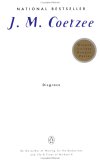Summary | Excerpt | Reading Guide | Reviews | Readalikes | Genres & Themes | Author Bio

Of her life outside Windsor Mansions Soraya reveals nothing. Soraya is not her
real name, that he is sure of. There are signs she has borne a child, or
children. It may be that she is not a professional at all. She may work for the
agency only one or two afternoons a week, and for the rest live a respectable
life in the suburbs, in Rylands or Athlone. That would be unusual for a Muslim,
but all things are possible these days.
About his own job he says little, not wanting to bore her. He earns his living
at the Cape Technical University, formerly Cape Town University College. Once a
professor of modern languages, he has been, since Classics and Modern Languages
were closed down as part of the great rationalization, adjunct professor of
communications. Like all rationalized personnel, he is allowed to offer one
special-field course a year, irrespective of enrolment, because that is good for
morale. This year he is offering a course in the Romantic poets. For the rest he
teaches Communications 101, 'Communication Skills', and Communications 201,
'Advanced Communication Skills'.
Although he devotes hours of each day to his new discipline, he finds its first
premise, as enunciated in the Communications 101 handbook, preposterous: 'Human
society has created language in order that we may communicate our thoughts,
feelings and intentions to each other.' His own opinion, which he does not air,
is that the origins of speech lie in song, and the origins of song in the need
to fill out with sound the overlarge and rather empty human soul.
In the course of a career stretching back a quarter of a century he has
published three books, none of which has caused a stir or even a ripple: the
first on opera (Boito and the Faust Legend: The Genesis of Mefistofele), the
second on vision as eros (The Vision of Richard of St Victor), the third on
Wordsworth and history (Wordsworth and the Burden of the Past).
In the past few years he has been playing with the idea of a work on Byron. At
first he had thought it would be another book, another critical opus. But all
his sallies at writing it have bogged down in tedium. The truth is, he is tired
of criticism, tired of prose measured by the yard. What he wants to write is
music: Byron in Italy, a meditation on love between the sexes in the form of a
chamber opera.
Through his mind, while he faces his Communications classes, flit phrases,
tunes, fragments of song from the unwritten work. He has never been much of a
teacher; in this transformed and, to his mind, emasculated institution of
learning he is more out of place than ever. But then, so are other of his
colleagues from the old days, burdened with upbringings inappropriate to the
tasks they are set to perform; clerks in a post-religious age.
Because he has no respect for the material he teaches, he makes no impression on
his students. They look through him when he speaks, forget his name. Their
indifference galls him more than he will admit. Nevertheless he fulfils to the
letter his obligations toward them, their parents, and the state. Month after
month he sets, collects, reads, and annotates their assignments, correcting
lapses in punctuation, spelling and usage, interrogating weak arguments,
appending to each paper a brief, considered critique.
He continues to teach because it provides him with a livelihood; also because it
teaches him humility, brings it home to him who he is in the world. The irony
does not escape him: that the one who comes to teach learns the keenest of
lessons, while those who come to learn learn nothing. It is a feature of his
profession on which he does not remark to Soraya. He doubts there is an irony to
match it in hers.
In the kitchen of the flat in Green Point there are a kettle, plastic cups, a
jar of instant coffee, a bowl with sachets of sugar. The refrigerator holds a
supply of bottled water. In the bathroom there is soap and a pile of towels, in
the cupboard clean bedlinen. Soraya keeps her makeup in an overnight bag. A
place of assignation, nothing more, functional, clean, well regulated.
From "Disgrace" by J.M. Coetzee. (c) November, 1999, used by permission of the publisher, Penguin Group.




The only completely consistent people are the dead
Click Here to find out who said this, as well as discovering other famous literary quotes!
Your guide toexceptional books
BookBrowse seeks out and recommends the best in contemporary fiction and nonfiction—books that not only engage and entertain but also deepen our understanding of ourselves and the world around us.